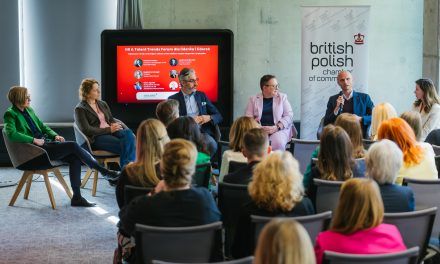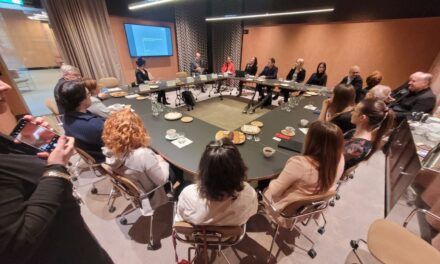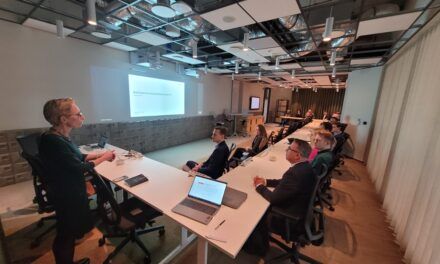The 2nd BPCC Female Leadership Forum took place on 12 December 2022, at the offices of Standard Chartered in Warsaw, with a focus on rebuilding connections, and how to motivate teams to act.
The event was moderated by Olga Grygier-Siddons, former CEO of PwC in Central and Eastern Europe, a non-executive board member and an advisor and mentor to senior business leaders. She welcomed participants and introduced Aleksandra Karasińska, editor-in-chief, of Forbes Women. Ms Karasińska’s presentation focused on the challenges posed by Generation Z, the youngest employees who are entering the labour market. Their expectations of life and work, their values and expectations are different to those of older workers, and getting the most of their talent requires new skill sets from leaders, she said. “They will not accept a toxic workplace.” The changes will benefit women; “they will be empowered by the new flexibility,” she said.
Ms Grygier-Siddons introduced the panellists: Anna Clunes, His Majesty’s Ambassador to Poland; Anna Urbańska, CEO of Standard Chartered’s business hub in Poland; Aneta Jóźwicka, chairwoman of the British Polish Chamber of Commerce and corporate relations director for Northern Europe at Diageo; Agnieszka Kulikowska, senior partner, Page Executive; and Cezary Żelaźnicki, CEE inclusion and diversity leader at PwC to present a male point of view.
War, inflation, pandemic, the energy crisis, high interest rates – the challenging external environment and the demands it makes on business leaders was mentioned by the panellists. These challenges can create a sense of purpose and mission that unites teams around goals. Generational differences and hybrid working were common threads; Ms Karasińska said that there is a shift away from the notion of ‘work-life balance’ to ‘work-life blending’, and that what is expected from a career has changed forever as a result of the pandemic. Ms Clunes said that the Russian invasion of Ukraine has had a massive impact on Embassy staff in terms of their willingness to work together to deal with the challenges the war has created. She also praised younger colleagues for bringing new ways of doing things to the workplace.
Aneta Jóźwicka explained how the pandemic had forced companies to rethink many business processes, but despite the changes, staff expectations remain high, especially among the younger employees. “They lack the patience, so if they couldn’t find what they were looking for, they’d just quit,” she said. Anna Urbańska, who leads a team of 1,200 people in Standard Charter’s Warsaw hub, says “people tell me that ‘work is work’. Expectations toward the employer are changing; employees are very vocal in what they want” Leadership, therefore, is about being able to deal with the pace of change, she said, and the ability to listen. Ms Grygier-Siddons agreed, speaking of a “changing contract” between employer and employee.
“The war for talent is over,” said Cezary Żelaźnicki. “And guess what – talent won.” Talking about the employees’ expectations, he said: “People today want a sense of belonging and a sense of purpose.” Agnieszka Kulikowska made the point that the pandemic made more women step down from challenging roles to take care of their families than men, also saying that employers are becoming more aware of the psychological pressures on employees, and are now offering counselling – something that has not previously been considered necessary.
Anna Urbańska said that leaders need to be more prepared to listen – Ms Grygier-Siddons agreed, saying that communication training has shifted away from teaching leaders how to project, and now focuses more on to how to actively listen. Ms Kulikowska mentioned another shift – from equality to equity – ensuring not so much the same inputs for everyone, as looking at the same results. Mr Żelaźnicki agreed that leadership needs to change mindset, with flexibility being the key – “we can have it all,” he said, but the process is complicated, and a greater challenge for leaders.
Remote working means empowering people to work without constant supervision, and this means that decisions are no longer taken by leaders alone – “everyone is expected to take decisions,” said Ms Jóźwicka. This makes the role of empowerment and trust shown by leaders in their teams extremely important, she said, in a business environment accelerated by technology. “Decisions from leaders are expected immediately,” she said. Ms Grygier-Siddons agreed with Ms Jóźwicka when she said that employees are seeking employers who are perceived to be a force for good; CSR and ESG really count in recruitment and retention. “Getting it wrong is a part of the uncertain business environment; leaders need to be tolerant of people who are learning by doing and not always getting it 100% right,” said Ms Grygier-Siddons. Ms Clunes stressed the importance of blurring of roles as empowerment meant decision-making at lower levels, something that requires culture change, especially in organisations with a long history and a traditional approach.
The Q&A session yielded some fascinating questions from the audience. Can employers still expect staff to work late into the night to meet clients’ expectations? Both Ms Kulikowska and Mr Żelażnicki replied that it is no longer acceptable to force staff to do this: “if you overload your people, you will lose them.” The values of young people have changed.
“We do business differently, we interact differently,” said Ms Jóźwicka, praising the diversity of the teams with which she works at Diageo. “The most innovative projects are being delivered by teams that are really diverse,” she said.
“How do you create a working environment in which everyone feels they belong?” – asked Ms Clunes. “Diversity is being invited to the party – inclusion is being able to enjoy yourself at that party,” said Ms Kulikowska. But it was more than just about enjoying oneself – she quoted a McKinsey survey which showed that firms with board diversity in the top quartile were more likely to have above-average profitability than firms in the bottom quartile of diversity.
Opening the Q&A session, Ms Karasińska made the point that women are under-represented in the media, with only 21% of senior positions in Polish media being held by women. This prompted a discussion about discrimination during the recruitment process, with employers weighing up the chances that a woman will want a career break to have children. Ms Grygier-Siddons said that a response to this is women stepping up to the challenges of leadership regardless of the hierarchy and initiating change.
There was an interesting discussion about how different the reality of female leadership is across Poland and CEE when compared to Western Europe? Things need to change, but are they changing? And are they changing fast enough? Even looking at Poland itself, there are stark differences between the way global corporates deal with diversity in the workplace, and how they are in Polish-owned businesses, which can all too often seem patriarchal.
One slogan that echoed through the two-hour-long meeting was that the very nature of leadership is changing in response to new conditions; managers should be “cheer-leaders not sergeant-majors”. The diversity and inclusivity agenda does lead to enhanced business results; businesses in any case should be thinking about people and the planet as much as about profit. A final thought around which there was consensus was that “different does not mean being better or worse”.
The forum ended with networking, and a chance to swap business cards and make new connections.








































